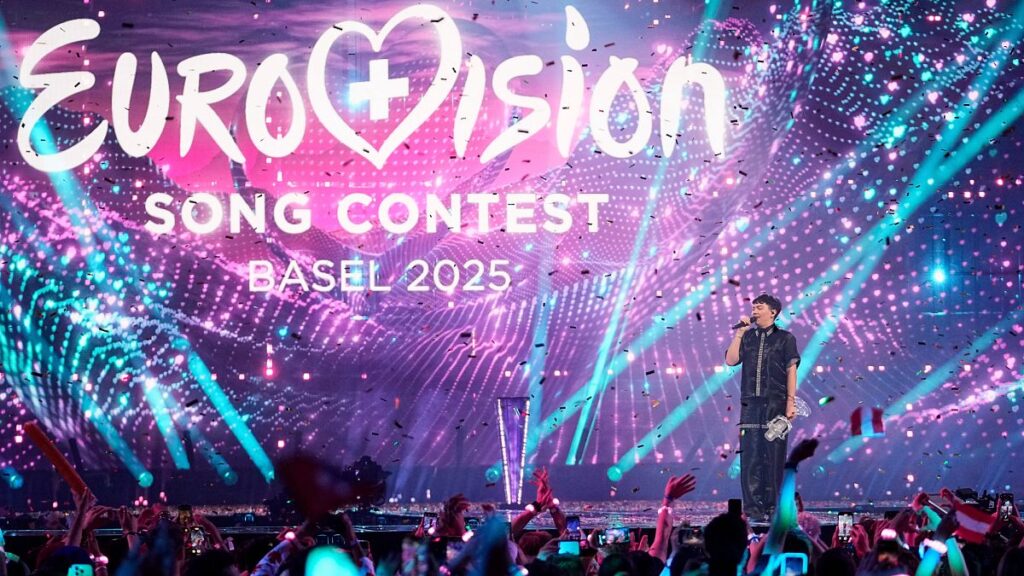Eurovision season is over for another year but people are still talking about it, including claims online that the iconic song contest was created by NATO.
Posts on social media and even some news outlets allege that the military alliance wanted to use it to imperially exert its soft power during the Cold War and beyond.
Some posts shared screenshots of a document from NATO’s Committee on Information and Cultural Relations, dated November 1955, which refers to a “North Atlantic Festival.”
The document says that a “performance” could be a subtle way to push a pro-NATO narrative among the general population.
“Consideration might be given to handing out NATO information brochures at the Festival,” the document says. “However, the desirability of doing so should be carefully weighed and, at first sight I believe it would be a mistake, since it would introduce an element of propaganda, and the Festival aims at achieving similar results by more subtle means.”
“In any case, it would be far more natural to influence public opinion in favour of NATO through the medium of the performance itself,” it continues.
The North Atlantic Festival isn’t the same thing as the ESC
However, while the document is authentic, it’s been taken out of context. It and other NATO archives show us that the alliance did float the idea of a “North Atlantic Festival”, but it was nothing like the Eurovision Song Contest and never even came to be as originally conceived.
It was to take place on the sidelines of a popular, annual military exhibition by the French army known as “Les Nuits de l’Armée”, sponsored by French magazine Paris Match. The display featured various performances and attracted thousands of spectators in Paris every year.
“The ‘NUITS DE L’ARMEE’ are popular not only because the show is of a very high standard and the physical arrangements excellent, but because the public loves the glitter and pageantry of a peaceful military display of this kind,” NATO said in one of the documents.
“It is this last consideration which has induced the publishers of ‘PARIS MATCH’ to envisage a North Atlantic Festival on the lines of the French ‘NUITS DE L’ARMEE’, in which selected units of the armed forces of the various NATO countries would take part.”
The idea was to showcase cultural military displays from different NATO members, such as a Scottish march to bagpipe music from the UK, a demonstration by Belgian police dogs, and a changing of the guard by Canadian Mounties.
The online claims appear based in part on the year the Eurovision Song Contest was first held: 1956, the year after NATO published some of these documents. The “North Atlantic Festival” may also have been conflated with the Eurovision Song Contest because they share certain traits and objectives, namely their intention to promote unity and peace in Europe and celebrate culture and media across the continent.
Another document mentions that the BBC suggested broadcasting the festival around Europe using the Eurovision network, owned by the European Broadcasting Union (EBU).
“The North Atlantic Festival project having recently been mentioned in London when the Information Division contacted the BBC Television Service, the latter stated that it would certainly be prepared to see that the programme was retransmitted over the Eurovision network (United Kingdom, France, Germany, Italy and the Netherlands),” NATO says in the document.
“The BBC authorities explained that a display such as the North Atlantic Festival was exactly the type of feature they were seeking,” it adds.
Nevertheless, the Eurovision network isn’t the same thing as the Eurovision Song Contest: the former is a broadcasting infrastructure created by the EBU in 1954 to exchange TV and radio content across Europe, while the latter is a specific entertainment programme that uses this network to broadcast a live music competition among participating countries.
The Eurovision Song Contest’s website states that the idea for the network came from Marcel Bezençon, director general of the Swiss Broadcasting Corporation, and that the idea for the contest came from RAI, Italy’s national broadcaster.
“The most popular and successful programme that the Eurovision Network would produce would be its namesake: the Eurovision Song Contest,” the website says. “Following suggestions put forward at the meeting of its Programme Committee in Monte Carlo, Monaco in 1955, the EBU decided at the session of its General Assembly in Rome later in that year to establish the Eurovision Song Contest.”
“The inspiration for the Contest came from RAI, which had been staging Festival di Sanremo (the Sanremo Italian Song Festival) in the seaside resort town of the same name from 1951,” it continues.
It’s also inaccurate to suggest that the Eurovision Song Contest was created to push pro-NATO propaganda against the USSR and later Russia, as some social media posts have. Both Russia and Belarus were full EBU members, including participation in the Eurovision Song Contest, until they were suspended in 2022 and 2021, respectively.
Neither country is a member of NATO, also showing the independence of the military alliance from the EBU.
Ultimately, a NATO official told EuroVerify that the alliance played no role in the creation of the song contest, describing claims to the contrary as inaccurate.
A spokesperson for the Eurovision Song Contest meanwhile said that “there is no truth to these claims at all”.
“The Eurovision Song Contest was created by the European Broadcasting Union in 1956, which continues to coordinate the competition on behalf of its Members – public service media from 56 countries,” the spokesperson said.
Read the full article here

